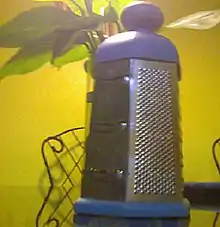Guayo
The guayo or ralladera is a metal scraper used as a percussion instrument in traditional styles of Cuban music such as changüí, predecessor of son cubano. Largely replaced by the güiro (gourd scraper) during the 20th century, the guayo is now rare. In the Dominican Republic, the güira, a similar metal scraper used in merengue, is sometimes called guayo. In contrast to Cuba, güiras replaced güiros in the early 20th century.[1]
.jpg.webp) | |
| Percussion instrument | |
|---|---|
| Other names | Ralladera |
| Classification | Metal idiophone |
| Hornbostel–Sachs classification | 112.23 (Scraped idiophone, vessel) |
| Playing range | |
| Speed of scrape produces some variation | |
| Related instruments | |
| Güiro, güira, guacharaca, reco-reco, quijada, washboard | |
In changüí

The guayo survives in Cuba almost exclusively as part of changüí performances in the eastern regions of the country (formerly known as the Oriente Province). It is one of the five instruments played in the genre together with the maracas, botija or marímbula, bongo, and tres.[2] Guayos consist of a cylindrical metal sheet with a cheese grater surface which is scraped with a metal rod or bone.[2]
Notable guayo players include Santiago Reyes "Chago Guayo", Carlos Borromeo Planche "Cambrón" and José Andrés Rodríguez Ramírez, all of which were also singers and members of Grupo Changüí de Guantánamo.[2]
See also
References
- Hutchinson, Sydney (2008). Merengue Tipico in Transnational Dominican Communities. New York, NY: New York University. pp. 294–295. ISBN 9780549819363.
- Lapidus, Benjamin (2008). Origins of Cuban Music and Dance: Changüí. Plymouth, UK: Scarecrow Press. pp. 16, 170. ISBN 9781461670292.
Further reading
- Ortiz, Fernando (1995). Los instrumentos de la música afrocubana: El guayo o la ralladera. La quijada. Havana, Cuba: Letras Cubanas.